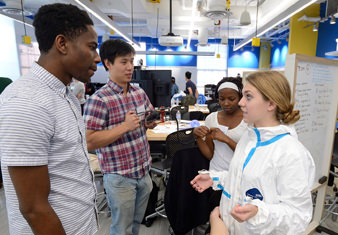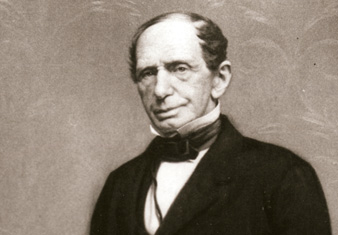
Responding to Autism
A collaboration in search of answers for children in need.
A rising number of diagnoses. A set of enduring questions about testing and definition. A cause still unknown. A cure elusive.
These are the puzzles of autism, a range of complex neurological issues that can exact an enormous toll on children and their families around the world.
 For years, Johns Hopkins and its affiliates have been at the forefront of efforts to solve them. The School of Medicine and the Kennedy Krieger Institute have been conducting world-class research into early detection and treatment on autism and other development disabilities. The Bloomberg School of Public Health has been applying its expertise to improve autism measurement, pursue environmental and genetic causes, and understand the impact of autism on families, service systems, and societies globally. The Brain Science Institute has been bringing together basic and clinical neuroscientists to explore the causes of autism.
For years, Johns Hopkins and its affiliates have been at the forefront of efforts to solve them. The School of Medicine and the Kennedy Krieger Institute have been conducting world-class research into early detection and treatment on autism and other development disabilities. The Bloomberg School of Public Health has been applying its expertise to improve autism measurement, pursue environmental and genetic causes, and understand the impact of autism on families, service systems, and societies globally. The Brain Science Institute has been bringing together basic and clinical neuroscientists to explore the causes of autism.
The Wendy Klag Center for Autism and Developmental Disabilities will unite a multi-disciplinary community of investigators and graduate students behind a common purpose: to research origins, detection, measurement, and prevention of the conditions of autism.
 This past year, the university launched a new center to coordinate and leverage this collective expertise. Housed in the Bloomberg School, the Wendy Klag Center for Autism and Developmental Disabilities unites a multidisciplinary community of investigators and graduate students behind a common purpose: to research origins, detection, measurement, and prevention of the conditions of autism and to evaluate services and policies that support affected children and their families.
This past year, the university launched a new center to coordinate and leverage this collective expertise. Housed in the Bloomberg School, the Wendy Klag Center for Autism and Developmental Disabilities unites a multidisciplinary community of investigators and graduate students behind a common purpose: to research origins, detection, measurement, and prevention of the conditions of autism and to evaluate services and policies that support affected children and their families.
More than 45 faculty at Johns Hopkins and Kennedy Krieger are now working in concert to achieve this goal.


